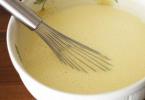Many motorists face this problem - On a hot engine, hydraulic compensators knock. In our article we will talk about this unpleasant phenomenon. Let's start with the fact that the knocking of hydraulic compensators can manifest itself not only on a hot engine, but also when starting it (cold). The appearance of knocking noise from hydraulic compensators in hot and cold engines may depend on the same or different reasons. There is an opinion that compensators knocking on the hot side more systematically. While on a cold engine this shock sound may appear only at some moments.

First of all, any motorist must make sure that the impact sound that appears is made exactly hydraulic compensators, and not some other engine component or mechanism internal combustion. You just need to check this on a hot engine. However, this is not difficult to do, since the knocking of compensators has a characteristic sound. However, if you doubt the diagnosis, it is better to contact specialists at a repair shop.
Now let's look at the reasons that cause knocking in hydraulic compensators. There are several such reasons, however, it is worth noting that not all of them are a problem with compensators.
The first (most common) reason. Compensators knocking because the engine was filled with low quality oil or it hasn’t changed for a long time. To avoid the appearance of impact sounds, we advise you to buy only high-quality motor oil from reliable suppliers.

The next reason is clogged channels through which engine oil should flow into the hydraulic compensators. And there will definitely be a knock on a hot engine, but when it’s cold it may not exist. The thing is that while the engine is cold, the engine oil in it has one viscosity, but as soon as the engine starts to warm up, the oil changes its viscosity and problems begin to appear. To remove this sound, you need to change the engine oil and thoroughly flush the entire system. In addition, it may be necessary to use a more viscous motor oil in the future.
The third reason is compensators knocking due to clogged oil filter. Engine oil simply does not approach the hydraulic compensators at the required pressure, resulting in the formation of airlock.

The fourth reason is increased or reduced level motor oil. In this case, the oil is enriched with air masses. While the engine is cold, the percentage of air in the oil is not yet high, in order to make it compressible. After running for a while, the engine heats up and the amount of air in the oil increases, making it critical. Resulting in hydraulic compensators they start knocking.
The fifth reason is caused by problems with the oil pump. This happens with worn-out pumps that do not produce the pressure required for the full functioning of the car’s lubrication system.
The sixth reason is wear of the seat for the hydraulic compensator. As a result of heating the engine, all its parts expand, respectively, seat The hydraulic compensator also expands and weakens even more, which causes knocking noises.
The seventh reason is in the hydraulic compensator itself. The knock appears due to problems with the hydraulics and mechanics of the compensator.
As you can see, there are many reasons for this type of knocking. Understanding them, let alone accurately determining which of them is the main one, is very difficult. Although, you don’t have to think about it and just change the entire chain starting from oil pump and ending with the compensators themselves. This, of course, will lead to a positive result, but how much will it all cost?
In our opinion, the most correct decision for a novice motorist is to turn to a normal specialist who certainly knows what method to use to find the cause of the knocking and how to optimally neutralize it.
(another name for hydraulic pusher) performs the functions of automatically adjusting the thermal clearances of car engine valves. However, as many car enthusiasts know, for some reason it begins to knock. Moreover, in different conditions- both cold and hot. This article describes why hydraulic compensators and hydraulic lifters knock.
How it works and why the hydraulic compensator knocks
Why are hydraulic compensators knocking?
Hydraulic compensators can tap for a variety of reasons. This is usually due to problems with the oil or oil system, engine hydraulics and so on. Moreover, the reasons differ significantly depending on the state of the engine - hot or cold.
Hydraulic compensators knock when hot
Let us briefly list the most common causes of hydraulic lifters knocking on a hot engine and what to do about it:
- Haven't had an oil change in a while or it is of poor quality.
What to do- to avoid similar problems, necessary . - Valves clogged. Moreover, the uniqueness of the situation lies in the fact that this problem can only be identified when the engine is hot. That is, with a cold engine there may or may not be a knocking noise.
What to do - flush the system, and also replace the lubricant, preferably with a more viscous one. - Oil filter clogged. As a result, the oil does not reach the hydraulic compensators at the required pressure. Therefore, an air lock forms, which is the cause of the problem.
What to do - replace oil filter. - Oil level mismatch. This could be either a reduced or increased level. The result is excessive saturation of the oil with air. And when the oil is oversaturated air mixture a corresponding knock occurs.

How to check the hydraulic compensator
What to do- the solution to this problem is normalization of oil level. - Incorrect operation of the oil pump. If it doesn't work for full power, then this may be a natural cause of the indicated problem.
What to do- check and adjust the oil pump. - Increased mounting location for hydraulic compensator. As the engine heats up, its volume increases even more, which is the cause of the knocking.
What to do- for help contact a mechanic. - Mechanical and hydraulic problems.
What to do- there can be many reasons here, so We recommend that you consult a specialist.
Hydraulic compensators knock when cold
Now let's list possible reasons that cause knocking of hydraulic compensators on a cold engine and what to do about it.
If earlier, after a certain number of thousands of kilometers, a car needed to adjust the engine valves, today, to the delight of car owners, such a need has practically disappeared. IN modern engines internal combustion, for optimal operation of the intake and exhaust valves hydraulic compensators respond.
This is quite simple devices, which, thanks to the oil pressure circulating inside the engine, ensure the most optimal fit of the valves and their normal operation in general. However, hydraulic compensators have their own service life and, moreover, they can fail much earlier than they should. And if at least one hydraulic compensator begins to die, a knock is heard.
We will now tell you why hydraulic compensators are knocking and how to delay the moment when they have to be changed.
Internal structure of the hydraulic compensator: 1 – cam camshaft; 2 – recess in the body of the hydraulic compensator; 3 – plunger bushing; 4 – plunger; 5 – plunger valve spring; 6 – timing valve spring; 7 – gap between the camshaft cam and the working surface of the hydraulic compensator; 8 — ball (plunger valve); 9 - oil channel in the body of the hydraulic compensator; 10 – oil channel in the cylinder head; 11 – plunger pair spring; 12 – gas distribution valve.
And so, what can cause hydraulic compensators to knock:
- insufficient lubrication;
- low quality oil;
- development of your own resource;
Let's look at these points in more detail. Insufficient lubrication internal elements hydraulic compensator, in particular the plunger, spring and cups, unplanned friction may occur, which leads to accelerated wear of the hydraulic compensator. Therefore, change the oil on time and monitor its level. By the way, this will extend the service life of not only hydraulic compensators, but also almost all components and parts of the engine.
The second point is the quality of the oil. If the oil is dirty, the channels through which it enters the hydraulic compensator will become clogged. Here there is a deterioration in the lubrication of the compensator parts and a deterioration in its operation, because this unit, or rather its functioning, is tied to oil pressure, standard pressure, meeting the design parameters. Accordingly, if the oil is clean, then the channels through which it circulates are completely passable and everything works as it should. If soot, scale, and other foreign inclusions are found in the oil flow, the channels will become clogged. Hence the deterioration in oil circulation, hence rapid wear hydraulic compensator, hence the disruption in its operation. And such violations, even if imperceptible at first, are reflected in the operation of the engine, and are reflected negatively.
And of course, no matter how good the oil is, no matter how much of it there is, sooner or later the hydraulic compensator parts will wear out. Meanwhile, with normal oil level and quality, hydraulic compensators operate for quite a long time, without any maintenance or monitoring.
What to do if hydraulic lifters are knocking

Since we have figured out why expansion joints knock, let's talk about what should a car owner do when he hears such a knock?
In general, there are no special alternatives here. You can, of course, wash the compensator to clear the clogged channels, but this is a temporary measure, since if there is a knock, it means there is a backlash. One way or another, the hydraulic compensators will need to be changed. And the plural is not a typo here. As a rule, if it starts knocking, at least one hydraulic compensator is replaced with all such components. They run on the same oil, and if one wears out, the others will follow very soon. Therefore, all compensators are replaced without exception.
Hydraulic compensators - good or evil
You often hear that you used to travel without unnecessary details and complications and did not spend as much money on a car as you have to spend today. But only those who are not familiar with the valve adjustment procedure can say this, especially if the car is driven frequently and over long distances. Well, about the happy owners of cars with gas installation, there is no need to talk at all. Moreover, even after adjusting the valves, the engine did not always run as smoothly and stably as is the case with hydraulic compensators. As for replacement costs, the engine itself, sooner or later, will exhaust its service life, this is not a reason to abandon it.
The operation of an internal combustion engine is necessarily associated with the release of heat. As you know from a physics course, when heat interacts with a metal, it expands. Motor designers take this fact into account when designing them and provide thermal clearances. Special attention When calculating thermal clearances, attention is paid to the valve mechanism of the car, where an error can lead to valve burnout or knocking in the engine.
So that car workshops and drivers can control the gap, in valve mechanism the engine can be adjusted. It must be performed as the machine operates, since worn parts lead to a change in the gap.
Initially, adjusting the gap was done using washers and levers, which was extremely inconvenient and also too difficult for the end driver. Over time, designers have offered more modern solution– use of hydraulic compensators. These mechanisms independently select the required gap and do not require additional settings. But problems can also arise with them, and the most well-known of them is the appearance of a knock during engine operation.
What are hydraulic compensators?
An automobile hydraulic compensator is a piston, with the bottom of which the camshaft cam interacts. There is a ball valve in the piston, the task of which is to open the valve to allow oil to enter the piston cavity. The plunger is responsible for transmitting force from the camshaft cam to the valve stem.
During operation, oil enters the piston. It fills free space, after which it begins to press on the plunger. This causes it to move upward along with the piston until the mechanism rests against the camshaft cam. Thus, it is possible to achieve automatic selection of the optimal gap due to the hydraulic compensator mechanism. When the camshaft cam presses on the hydraulic compensator piston, some of the oil pours out of it, after which the ball valve blocks the path of the oil, the piston moves down and a gap is created.

The hydraulic compensator, unlike washers and levers, does not require additional adjustment when engine parts wear out. In any case, the gap is adjusted due to the flow of more oil into the hydraulic compensator.
Why is the hydraulic compensator knocking?

A faulty hydraulic compensator is easy to determine. If there are problems with this element, it begins to knock during operation. The consequence of the hydraulic compensator knocking is incorrect or untimely adjustment valve clearance, which can lead to engine problems.
The reasons why the engine hydraulic compensator knocks can be classified according to the conditions under which they occur. Depending on whether the hydraulic lifters are knocking on a cold or warm engine, the faults that can cause the problem differ.
Hydraulic lifters knock on a cold engine
Problems with the operation of hydraulic compensators can arise in two cases: if the mechanism itself malfunctions or due to problems in the oil supply system. On a cold engine, the following are the main reasons why hydraulic compensators knock:

Important: It is necessary to distinguish between the knocking of hydraulic compensators on a cold engine and when the engine starts. Many drivers are mistaken in believing that if a characteristic sound is heard when starting the engine, there are problems with the hydraulic compensators. The knocking noise may occur and subside quickly because some of the valves remain open (due to the location of the camshaft) after the engine is stopped.
Hydraulic compensators knock on a hot engine
The reasons for the knocking of hydraulic compensators on a hot engine partially repeat the malfunctions that cause this problem to occur on a cold engine. Here are some problems that are typical only for a hot engine:

The situation when hydraulic compensators knock only on a hot engine rarely occurs. Most often, the problem occurs both on a cold and warm engine, and it is associated with bad oil, polluted oil filter or damage to the hydraulic compensator.
How to identify a knocking hydraulic compensator

Since there are several hydraulic compensators installed in the engine, it is necessary to determine which of them is knocking during operation before replacing or performing detailed diagnostics. IN service centers The search for a faulty mechanism is carried out using a special device for measuring noise levels. Acoustic diagnostics is effective method when searching for a problematic hydraulic compensator.
You can also diagnose the hydraulic compensator on a disassembled engine. To check them you will need to remove valve cover, and then make efforts to push through each element separately. Hydraulic compensators, which will be easily recessed under external influence, have insufficient pressure oil, which indicates their malfunction. A jammed hydraulic compensator cannot be drowned using human power.
Important: Pay attention that during the diagnostic process the hydraulic compensators are not pressed by the camshaft cam.
What causes a malfunction of hydraulic compensators?
 Problems with hydraulic compensators do not have a strong impact on the wear of other engine components, but the solution to the problem should not be delayed. Troubleshooting of the hydraulic compensator should be carried out, since problems that arise may indicate a malfunction of the lubrication system.
Problems with hydraulic compensators do not have a strong impact on the wear of other engine components, but the solution to the problem should not be delayed. Troubleshooting of the hydraulic compensator should be carried out, since problems that arise may indicate a malfunction of the lubrication system.
Faulty hydraulic compensators themselves will lead to a decrease in engine power, deterioration in vehicle acceleration dynamics and an increase in gasoline consumption.
What to do if hydraulic lifters are knocking
 In most cases, knocking of hydraulic compensators is associated with problems in the lubrication system, which are caused by poor oil. Therefore, when extraneous sounds of hydraulic compensators on a cold or hot engine, the first step is to change the oil and oil filter.
In most cases, knocking of hydraulic compensators is associated with problems in the lubrication system, which are caused by poor oil. Therefore, when extraneous sounds of hydraulic compensators on a cold or hot engine, the first step is to change the oil and oil filter.
Please note: The first start of the engine after changing the oil will again be accompanied by knocking noises from the hydraulic compensators. This is due to the fact that after draining the old oil, the hydraulic compensators become “empty”.
If changing the oil did not help fix the problem, you need to determine which hydraulic compensator is knocking during operation. Having identified faulty element, you can remove it from the engine and try washing it in gasoline or kerosene, and then put it back in place. This will help if the cause of the knocking lies in contamination of the hydraulic compensator.
Important: After washing, hydraulic compensators must be installed in the position where they were before removal.
When flushing the hydraulic compensators does not help solve the problem of knocking in them, the elements will need to be replaced.
Etc. Often, the appearance of such extraneous sounds indicates the need for adjustment or disassembly of the engine for repair and repair. Among the various products on the auto chemical market, you can find such a solution as an additive against engine knocking.
It is important to understand that if power unit repair is necessary, then in this case the use of an additive can only mask the problem for a while, but not solve it. If we talk about plain bearings (connecting rod and main bearings), then this is quite fair. However, it is worth highlighting that in some cases the additive may be effective way fight against knocking. For example, if we are talking about . Let's look at this issue in more detail.
Read in this article
Why are hydraulic compensators knocking?
As a rule, on many modern used engines, noise from hydraulic compensators appears, which drivers usually detect when cold. Let us immediately note that in such a situation, a short-term knock of the main battery, which disappears a few seconds after starting the cold one, can be considered the norm. If the hydraulic compensators continue to knock for quite a long time or the knocking does not go away even after warming up, this indicates problems with these elements.
In a nutshell, a hydraulic compensator is a device that is designed to automatic engine internal combustion. In fact, the hydraulic compensator is the one that receives engine oil from the engine.
Without going into details, the compensator sits between the valve and the cam. The principle of operation is that when the valve is closed, the main body is pressed by means of a spring against the camshaft cam. Then, when the shaft is turned, the hydraulic compensator is compressed, a little engine oil is squeezed out of the plunger pair through a special valve, and then the oil outlet is blocked.
Afterwards, a gap is formed again, which, when the shaft is rotated 180 degrees, will be leveled again due to the spring of the plunger pair and a fresh portion of oil pumped into the main body. This operation of the hydraulic compensator allows, regardless of the engine temperature and the degree of thermal expansion of the parts, to always set the required valve clearance. Hydraulic compensators avoid the need to adjust the valves; their presence eliminates any adjustments and simplifies the maintenance of the internal combustion engine.
Naturally, the first reason for knocking of the main engine is wear of these elements. It is important to understand that supplying lubricant into thin channels in order to be able to automatically select the gap also significantly increases the requirements for the quality of the engine oil itself.
In other words, unsuitable in its properties or dirty oil can damage hydraulic compensators, as a result of which they first begin to knock and make noise. Further, the problem may progress, which is expressed in the form of malfunctions, hanging valves, etc.
How to remove the knocking of hydraulic compensators with an additive and what composition is best to fill

It is quite obvious that in the event of serious problems with the main housing, it is better to immediately begin repairs. If the knocking of the compensators appeared not so long ago, but the new one did not produce noticeable results, then special additives may be a way out of the current situation.
In other words, if the parts are not very worn out or repairs for one reason or another cannot be carried out in a timely manner, a high-quality additive in many cases can neutralize extraneous noise, and sometimes for quite a long period of time.
The main task is to choose optimal option, since there are a large number of restoring, protective, anti-smoke, anti-friction and other compounds on sale different manufacturers. First of all, attention should be paid to the original additives famous manufacturers, which are designed to eliminate the knock of hydraulic fluid and combine well with motor oils.
Hydraulic compensators: what they are, what function they perform, hydraulic compensator malfunctions and symptoms. Do-it-yourself repair and washing of hydraulic compensators.





